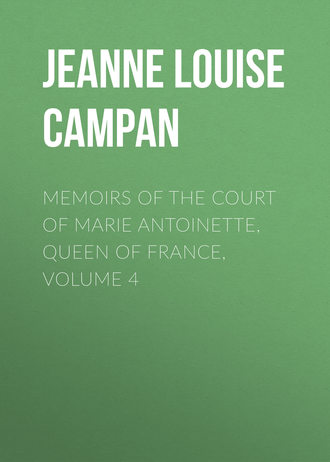 полная версия
полная версияMemoirs of the Court of Marie Antoinette, Queen of France, Volume 4
The influence of the Comtesse de Polignac increased daily; and her friends availed themselves of it to effect changes in the Ministry. The dismissal of M. de Montbarrey, a man without talents or character, was generally approved of. It was rightly attributed to the Queen. He had been placed in administration by M. de Maurepas, and maintained by his aged wife; both, of course, became more inveterate than ever against the Queen and the Polignac circle.
The appointment of M. de Segur to the place of Minister of War, and of M. de Castries to that of Minister of Marine, were wholly the work of that circle. The Queen dreaded making ministers; her favourite often wept when the men of her circle compelled her to interfere. Men blame women for meddling in business, and yet in courts it is continually the men themselves who make use of the influence of the women in matters with which the latter ought to have nothing to do.
When M. de Segur was presented to the Queen on his new appointment, she said to me, "You have just seen a minister of my making. I am very glad, so far as regards the King's service, that he is appointed, for I think the selection a very good one; but I almost regret the part I have taken in it. I take a responsibility upon myself. I was fortunate in being free from any; and in order to relieve myself from this as much as possible I have just promised M. de Segur, and that upon my word of honour, not to back any petition, nor to hinder any of his operations by solicitations on behalf of my proteges."
During the first administration of M. Necker, whose ambition had not then drawn him into schemes repugnant to his better judgment, and whose views appeared to the Queen to be very judicious, she indulged in hopes of the restoration of the finances. Knowing that M. de Maurepas wished to drive M. Necker to resign, she urged him to have patience until the death of an old man whom the King kept about him from a fondness for his first choice, and out of respect for his advanced age. She even went so far as to tell him that M. de Maurepas was always ill, and that his end could not be very distant. M. Necker would not wait for that event. The Queen's prediction was fulfilled. M. de Maurepas ended his days immediately after a journey to Fontainebleau in 1781.
M. Necker had retired. He had been exasperated by a piece of treachery in the old minister, for which he could not forgive him. I knew something of this intrigue at the time; it has since been fully explained to me by Madame la Marechale de Beauvau. M. Necker saw that his credit at Court was declining, and fearing lest that circumstance should injure his financial operations, he requested the King to grant him some favour which might show the public that he had not lost the confidence of his sovereign. He concluded his letter by pointing out five requests—such an office, or such a mark of distinction, or such a badge of honour, and so on, and handed it to M. de Maurepas. The or's were changed into and's; and the King was displeased at M. Necker's ambition, and the assurance with which he displayed it. Madame la Marechale de Beauvau assured me that the Marechal de Castries saw the minute of M. Necker's letter, and that he likewise saw the altered copy.
The interest which the Queen took in M. Necker died away during his retirement, and at last changed into strong prejudice against him. He wrote too much about the measures he would have pursued, and the benefits that would have resulted to the State from them. The ministers who succeeded him thought their operations embarrassed by the care that M. Necker and his partisans incessantly took to occupy the public with his plans; his friends were too ardent. The Queen discerned a party spirit in these combinations, and sided wholly with his enemies.
After those inefficient comptrollers-general, Messieurs Joly de Fleury and d'Ormesson, it became necessary to resort to a man of more acknowledged talent, and the Queen's friends, at that time combining with the Comte d'Artois and with M. de Vergennes, got M. de Calonne appointed. The Queen was highly displeased, and her close intimacy with the Duchesse de Polignac began to suffer for this.
Her Majesty, continuing to converse with me upon the difficulties she had met with in private life, told me that ambitious men without merit sometimes found means to gain their ends by dint of importunity, and that she had to blame herself for having procured M. d'Adhemar's appointment to the London embassy, merely because he teased her into it at the Duchess's house. She added, however, that it was at a time of perfect peace with the English; that the Ministry knew the inefficiency of M. d'Adhemar as well as she did, and that he could do neither harm nor good.
Often in conversations of unreserved frankness the Queen owned that she had purchased rather dearly a piece of experience which would make her carefully watch over the conduct of her daughters-in-law, and that she would be particularly scrupulous about the qualifications of the ladies who might attend them; that no consideration of rank or favour should bias her in so important a choice. She attributed several of her youthful mistakes to a lady of great levity, whom she found in her palace on her arrival in France. She also determined to forbid the Princesses coming under her control the practice of singing with professors, and said, candidly, and with as much severity as her slanderers could have done, "I ought to have heard Garat sing, and never to have sung duets with him."
The indiscreet zeal of Monsieur Augeard contributed to the public belief that the Queen disposed of all the offices of finance. He had, without any authority for doing so, required the committee of fermiers-general to inform him of all vacancies, assuring them that they would be meeting the wishes of the Queen. The members complied, but not without murmuring. When the Queen became aware of what her secretary had done, she highly disapproved of it, caused her resentment to be made known to the fermiers-general, and abstained from asking for appointments,—making only one request of the kind, as a marriage portion for one of her attendants, a young woman of good family.
CHAPTER XII
The Queen did not sufficiently conceal the dissatisfaction she felt at having been unable to prevent the appointment of M. de Calonne; she even one day went so far as to say at the Duchess's, in the midst of the partisans and protectors of that minister, that the finances of France passed alternately from the hands of an honest man without talent into those of a skilful knave. M. de Calonne was thus far from acting in concert with the Queen all the time that he continued in office; and, while dull verses were circulated about Paris describing the Queen and her favourite dipping at pleasure into the coffers of the comptroller-general, the Queen was avoiding all communication with him.
During the long and severe winter of 1783-84 the King gave three millions of livres for the relief of the indigent. M. de Calonne, who felt the necessity of making advances to the Queen, caught at this opportunity of showing her respect and devotion. He offered to place in her hands one million of the three, to be distributed in her name and under her direction. His proposal was rejected; the Queen answered that the charity ought to be wholly distributed in the King's name, and that she would this year debar herself of even the slightest enjoyments, in order to contribute all her savings to the relief of the unfortunate.
The moment M. de Calonne left the closet the Queen sent for me: "Congratulate me, my dear," said she; "I have just escaped a snare, or at least a matter which eventually might have caused me much regret." She related the conversation which had taken place word for word to me, adding, "That man will complete the ruin of the national finances. It is said that I placed him in his situation. The people are made to believe that I am extravagant; yet I have refused to suffer a sum of money from the royal treasury, although destined for the most laudable purpose, even to pass through my hands."
The Queen, making monthly retrenchments from the expenditure of her privy purse, and not having spent the gifts customary at the period of her confinement, was in possession of from five to six hundred thousand francs, her own savings. She made use of from two to three hundred thousand francs of this, which her first women sent to M. Lenoir, to the cures of Paris and Versailles, and to the Soeurs Hospitalieres, and so distributed them among families in need.
Desirous to implant in the breast of her daughter not only a desire to succour the unfortunate, but those qualities necessary for the due discharge of that duty, the Queen incessantly talked to her, though she was yet very young, about the sufferings of the poor during a season so inclement. The Princess already had a sum of from eight to ten thousand francs for charitable purposes, and the Queen made her distribute part of it herself.
Wishing to give her children yet another lesson of beneficence, she desired me on New Year's eve to get from Paris, as in other years, all the fashionable playthings, and have them spread out in her closet. Then taking her children by the hand, she showed them all the dolls and mechanical toys which were ranged there, and told them that she had intended to give them some handsome New Year's gifts, but that the cold made the poor so wretched that all her money was spent in blankets and clothes to protect them from the rigour of the season, and in supplying them with bread; so that this year they would only have the pleasure of looking at the new playthings. When she returned with her children into her sitting-room, she said there was still an unavoidable expense to be incurred; that assuredly many mothers would at that season think as she did,—that the toyman must lose by it; and therefore she gave him fifty Louis to repay him for the cost of his journey, and console him for having sold nothing.
The purchase of St. Cloud, a matter very simple in itself, had, on account of the prevailing spirit, unfavourable consequences to the Queen.
The palace of Versailles, pulled to pieces in the interior by a variety of new arrangements, and mutilated in point of uniformity by the removal of the ambassadors' staircase, and of the peristyle of columns placed at the end of the marble court, was equally in want of substantial and ornamental repair. The King therefore desired M. Micque to lay before him several plans for the repairs of the palace. He consulted me on certain arrangements analogous to some of those adopted in the Queen's establishment, and in my presence asked M. Micque how much money would be wanted for the execution of the whole work, and how many years he would be in completing it. I forget how many millions were mentioned: M. Micque replied that six years would be sufficient time if the Treasury made the necessary periodical advances without any delay. "And how many years shall you require," said the King, "if the advances are not punctually made?"—"Ten, Sire," replied the architect. "We must then reckon upon ten years," said his Majesty, "and put off this great undertaking until the year 1790; it will occupy the rest of the century."
The King afterwards talked of the depreciation of property which took place at Versailles whilst the Regent removed the Court of Louis XV. to the Tuileries, and said that he must consider how to prevent that inconvenience; it was the desire to do this that promoted the purchase of St. Cloud. The Queen first thought of it one day when she was riding out with the Duchesse de Polignac and the Comtesse Diane; she mentioned it to the King, who was much pleased with the thought,—the purchase confirming him in the intention, which he had entertained for ten years, of quitting Versailles.
The King determined that the ministers, public officers, pages, and a considerable part of his stabling should remain at Versailles. Messieurs de Breteuil and de Calonne were instructed to treat with the Duc d'Orleans for the purchase of St. Cloud; at first they hoped to be able to conclude the business by a mere exchange. The value of the Chateau de Choisy, de la Muette, and a forest was equivalent to the sum demanded by the House of Orleans; and in the exchange which the Queen expected she only saw a saving to be made instead of an increase of expense. By this arrangement the government of Choisy, in the hands of the Duc de Coigny, and that of La Muette, in the hands of the Marechal de Soubise, would be suppressed. At the same time the two concierges, and all the servants employed in these two royal houses, would be reduced; but while the treaty was going forward Messieurs de Breteuil and de Calonne gave up the point of exchange, and some millions in cash were substituted for Choisy and La Muette.
The Queen advised the King to give her St. Cloud, as a means of avoiding the establishment of a governor; her plan being to have merely a concierge there, by which means the governor's expenses would be saved. The King agreed, and St. Cloud was purchased for the Queen. She provided the same liveries for the porters at the gates and servants at the chateau as for those at Trianon. The concierge at the latter place had put up some regulations for the household, headed, "By order of the Queen." The same thing was done at St. Cloud. The Queen's livery at the door of a palace where it was expected none but that of the King would be seen, and the words "By order of the Queen" at the head of the printed papers pasted near the iron gates, caused a great sensation, and produced a very unfortunate effect, not only among the common people, but also. among persons of a superior class. They saw in it an attack upon the customs of monarchy, and customs are nearly equal to laws. The Queen heard of this, but she thought that her dignity would be compromised if she made any change in the form of these regulations, though they might have been altogether superseded without inconvenience. "My name is not out of place," said she, "in gardens belonging to myself; I may give orders there without infringing on the rights of the State." This was her only answer to the representations which a few faithful servants ventured to make on the subject. The discontent of the Parisians on this occasion probably induced M. d'Espremenil, upon the first troubles about the Parliament, to say that it was impolitic and immoral to see palaces belonging to a Queen of France.
[The Queen never forgot this affront of M. d'Espremenil's; she said that as it was offered at a time when social order had not yet been disturbed, she had felt the severest mortification at it. Shortly before the downfall of the throne M. Espremenil, having openly espoused the King's side, was insulted in the gardens of the Tuileries by the Jacobins, and so ill-treated that he was carried home very ill. Somebody recommended the Queen, on account of the royalist principles he then professed, to send and inquire for him. She replied that she was truly grieved at what had happened to M. d'Espremenil, but that mere policy should never induce her to show any particular solicitude about the man who had been the first to make so insulting an attack upon her character.—MADAME CAMPAN]
The Queen was very much dissatisfied with the manner in which M. de Calonne had managed this matter. The Abbe de Vermond, the most active and persevering of that minister's enemies, saw with delight that the expedients of those from whom alone new resources might be expected were gradually becoming exhausted, because the period when the Archbishop of Toulouse would be placed over the finances was thereby hastened.
The royal navy had resumed an imposing attitude during the war for the independence of America; glorious peace with England had compensated for the former attacks of our enemies upon the fame of France; and the throne was surrounded by numerous heirs. The sole ground of uneasiness was in the finances, but that uneasiness related only to the manner in which they were administered. In a word, France felt confident in its own strength and resources, when two events, which seem scarcely worthy of a place in history, but which have, nevertheless, an important one in that of the French Revolution, introduced a spirit of ridicule and contempt, not only against the highest ranks, but even against the most august personages. I allude to a comedy and a great swindling transaction.
Beaumarchais had long possessed a reputation in certain circles in Paris for his wit and musical talents, and at the theatres for dramas more or less indifferent, when his "Barbier de Seville" procured him a higher position among dramatic writers. His "Memoirs" against M. Goesman had amused Paris by the ridicule they threw upon a Parliament which was disliked; and his admission to an intimacy with M. de Maurepas procured him a degree of influence over important affairs. He then became ambitious of influencing public opinion by a kind of drama, in which established manners and customs should be held up to popular derision and the ridicule of the new philosophers. After several years of prosperity the minds of the French had become more generally critical; and when Beaumarchais had finished his monstrous but diverting "Mariage de Figaro," all people of any consequence were eager for the gratification of hearing it read, the censors having decided that it should not be performed. These readings of "Figaro" grew so numerous that people were daily heard to say, "I have been (or I am going to be) at the reading of Beaumarchais's play." The desire to see it performed became universal; an expression that he had the art to use compelled, as it were, the approbation of the nobility, or of persons in power, who aimed at ranking among the magnanimous; he made his "Figaro" say that "none but little minds dreaded little books." The Baron de Breteuil, and all the men of Madame de Polignac's circle, entered the lists as the warmest protectors of the comedy. Solicitations to the King became so pressing that his Majesty determined to judge for himself of a work which so much engrossed public attention, and desired me to ask M. Le Noir, lieutenant of police, for the manuscript of the "Mariage de Figaro." One morning I received a note from the Queen ordering me to be with her at three o'clock, and not to come without having dined, for she should detain me some time. When I got to the Queen's inner closet I found her alone with the King; a chair and a small table were ready placed opposite to them, and upon the table lay an enormous manuscript in several books. The King said to me, "There is Beaumarchais's comedy; you must read it to us. You will find several parts troublesome on account of the erasures and references. I have already run it over, but I wish the Queen to be acquainted with the work. You will not mention this reading to any one."
I began. The King frequently interrupted me by praise or censure, which was always just. He frequently exclaimed, "That's in bad taste; this man continually brings the Italian concetti on the stage." At that soliloquy of Figaro in which he attacks various points of government, and especially at the tirade against State prisons, the King rose up and said, indignantly:
"That's detestable; that shall never be played; the Bastille must be destroyed before the license to act this play can be any other than an act of the most dangerous inconsistency. This man scoffs at everything that should be respected in a government."
"It will not be played, then?" said the Queen.
"No, certainly," replied Louis XVI.; "you may rely upon that."
Still it was constantly reported that "Figaro" was about to be performed; there were even wagers laid upon the subject; I never should have laid any myself, fancying that I was better informed as to the probability than anybody else; if I had, however, I should have been completely deceived. The protectors of Beaumarchais, feeling certain that they would succeed in their scheme of making his work public in spite of the King's prohibition, distributed the parts in the "Mariage de Figaro" among the actors of the Theatre Francais. Beaumarchais had made them enter into the spirit of his characters, and they determined to enjoy at least one performance of this so-called chef d'oeuvre. The first gentlemen of the chamber agreed that M. de la Ferte should lend the theatre of the Hotel des Menus Plaisirs, at Paris, which was used for rehearsals of the opera; tickets were distributed to a vast number of leaders of society, and the day for the performance was fixed. The King heard of all this only on the very morning, and signed a 'lettre de cachet,'—[A 'lettre de cachet' was any written order proceeding from the King. The term was not confined merely to orders for arrest.]—which prohibited the performance. When the messenger who brought the order arrived, he found a part of the theatre already filled with spectators, and the streets leading to the Hotel des Menus Plaisirs filled with carriages; the piece was not performed. This prohibition of the King's was looked upon as an attack on public liberty.
The disappointment produced such discontent that the words oppression and tyranny were uttered with no less passion and bitterness at that time than during the days which immediately preceded the downfall of the throne. Beaumarchais was so far put off his guard by rage as to exclaim, "Well, gentlemen, he won't suffer it to be played here; but I swear it shall be played,—perhaps in the very choir of Notre-Dame!" There was something prophetic in these words. It was generally insinuated shortly afterwards that Beaumarchais had determined to suppress all those parts of his work which could be obnoxious to the Government; and on pretence of judging of the sacrifices made by the author, M. de Vaudreuil obtained permission to have this far-famed "Mariage de Figaro" performed at his country house. M. Campan was asked there; he had frequently heard the work read, and did not now find the alterations that had been announced; this he observed to several persons belonging to the Court, who maintained that the author had made all the sacrifices required. M. Campan was so astonished at these persistent assertions of an obvious falsehood that he replied by a quotation from Beaumarchais himself, and assuming the tone of Basilio in the "Barbier de Seville," he said, "Faith, gentlemen, I don't know who is deceived here; everybody is in the secret." They then came to the point, and begged him to tell the Queen positively that all which had been pronounced reprehensible in M. de Beaumarchais's play had been cut out. My father-in-law contented himself with replying that his situation at Court would not allow of his giving an opinion unless the Queen should first speak of the piece to him. The Queen said nothing to him about the matter. Shortly, afterwards permission to perform this play was at length obtained. The Queen thought the people of Paris would be finely tricked when they saw merely an ill-conceived piece, devoid of interest, as it must appear when deprived of its Satire.
["The King," says Grimm, "made sure that the public would judge unfavourably of the work." He said to the Marquis de Montesquiou, who was going to see the first representation, 'Well, what do you augur of its success?'—'Sire, I hope the piece will fail.'—'And so do I,' replied the King.
"There is something still more ridiculous than my piece," said Beaumarchais himself; "that is, its success." Mademoiselle Arnould foresaw it the first day, and exclaimed, "It is a production that will fail fifty nights successively." There was as crowded an audience on the seventy-second night as on the first. The following is extracted from Grimm's 'Correspondence.'
"Answer of M. de Beaumarchais to –, who requested the use of his private box for some ladies desirous of seeing 'Figaro' without being themselves seen.
"I have no respect for women who indulge themselves in seeing any play which they think indecorous, provided they can do so in secret. I lend myself to no such acts. I have given my piece to the public, to amuse, and not to instruct, not to give any compounding prudes the pleasure of going to admire it in a private box, and balancing their account with conscience by censuring it in company. To indulge in the pleasure of vice and assume the credit of virtue is the hypocrisy of the age. My piece is not of a doubtful nature; it must be patronised in good earnest, or avoided altogether; therefore, with all respect to you, I shall keep my box." This letter was circulated all over Paris for a week.]








